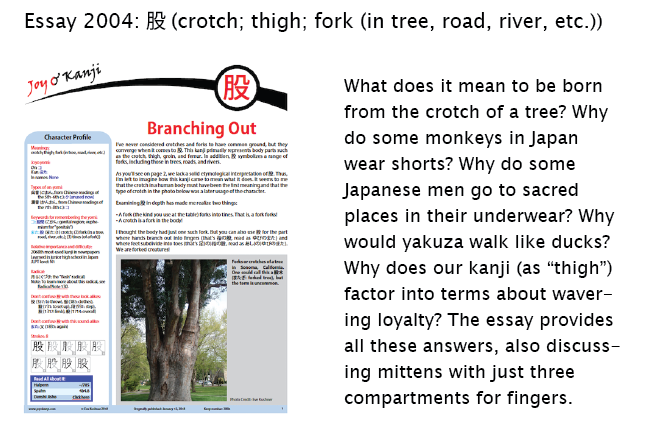First Blog of the Year
It's a new year, or so it seems, but an unthinkable two weeks have already passed. They slid right by when I wasn't looking. What the hell happened? I really can't say, except that this word may be relevant:
二の足 (にのあし: hesitation) 2nd + step
The term literally means “second step.” Imagine that you take an initial step without thinking about it, only then realizing that it may not be wise to proceed. You will hesitate to take a second step.
This idea reminds me of the timeless wisdom that you should never think too hard about walking up a flight of stairs or else you'll surely trip in the process.
Did an unproductive two weeks slip by because I hesitated to plunge into kanji again? Or was I still recovering from 2017? For that idea, this term applies:
濃い一年 (こいいちねん: a year full of events; a year full of meaning)
concentrated + 1 + year
A corollary term refers to just a day:
濃い一日 (こいいちにち: a day full of events; a day full of meaning)
concentrated + 1 + day
If a year or day has felt quite substantial, the Japanese see it as concentrated, thick, or dense (濃い), as if it were a liquid full of a substance, much as strong coffee is. The terms are neutral but, to one native speaker I asked, they feel more positive than negative.
Here's a way to say that you had a 濃い kind of year:
今年はいろんな意味で濃い一年でございました。
This year was quite eventful and full of meaning.
今年 (ことし: this year); 意味 (いみ: meaning)
Maybe your year was so "eventful" as to leave you feeling flattened. If so, you may have uttered one or two of these:
弱音 (よわね: feeble complaint; whine) weak + sounds
One makes such noises when feeling powerless and on the verge of giving up. The Japanese perceive such whimpers as “the sound of weakness." (For some reason, that doesn't have the same ring as The Sound of Music.)
When you take weakness and make it "big," what do you have? If I delay answering, I might hear some whimpers from you, so I'll tell you right away:
大弱り (おおよわり: extremely troubled; very puzzled) very + weakened
Actually, the 大 here means "very," serving to intensify the weakness that 弱り represents. That 弱り is the noun form of the verb 弱る (よわる: to be weakened). If one is very much annoyed, one is also very much weakened. (Maybe that's why I'm so tired all the time.)
By the way, embarrassment and adversity also make people feel weak, in the Japanese frame of mind. (I just don't stand a chance then!)
With all these emotions floating around, let me ask you what the following term could mean figuratively with its second meaning:
目を細める (めをほそめる: (1) to close one's eyes partly; squint; (2) ____)
eyes + to narrow
a. to look down on someone
b. to smile with one's whole face
c. to shoot someone a withering glance
d. to think in a very limited way
I'll block the answer with a preview of the newest essay:
b. The second meaning of 目を細める (めをほそめる: eyes + to narrow) is "to smile with one's whole face" or "to look fondly." Really?! It's a good thing when someone squints at you?!
I've really enjoyed blogging today. I do think I was afraid to take the plunge back in—and god knows why, as this is my 274th JOK Notebook post, so it's hardly unknown territory. I suppose it's just human nature to be afraid of what hasn't yet been written—on a page or in a new year (one that's rapidly becoming not so new!).
And with that I need to tell you two more things:
• There's an ongoing deal that you should definitely take advantage of in the next two weeks, as it won't come around often:
• No 弱音-type whimpering will be permitted from any of us as we tackle kanji and whatever challenges the new year presents.
❖❖❖
Did you like this post? Express your love by supporting Joy o' Kanji on Patreon:




Comments